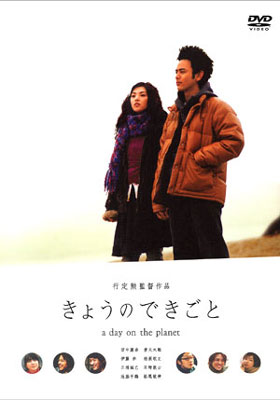|
|
|
|
|
|
|
A
Day on the Planet |
|
| |
|
review | availability | |

Availability:
DVD (KOREA)
Region 3 NTSC
Cinema Service
2-Disc Set
16x9 Anamorphic Widescreen
Korean Language Track
Dolby Digital 5.1
Removable English and Korean subtitles
Various extras

|
|
Year: |
2004 |
|
Director: |
Isao
Yukisada |
|
Cast: |
Rena
Tanaka, Ayumi Ito, Satoshi Tsumabuki, Shuuji Kashiwabara,
Atsushi Ishino, Toshinobu Matsuo, Chizuru Ikewaki |
|
The
Skinny: |
Despite
a few interesting characters and quirky situations,
this exercise in minimalist filmmaking isn't for everyone
- even though director Isao Yukisada went on to make
the biggest Japanese film of 2004 a few months later. |
|
Review
by
Kevin Ma: |
Isao
Yukisada started out as an assistant director under
Shunji Iwai (Love Letter, All About Lily Chou-Chou)
and went on to become one of Japan's most prolific working
directors. In the past year, he directed one of Japan's
biggest hits Crying Out Love, in the Center of the
World, and is following that up less than a year
later with the historical epic Year One in the North,
starring Ken Watanabe of The Last Samurai. A
Day on the Planet is one of his lesser-known works,
and was released quietly in theaters a few months before
Crying Out Love. Unlike Yukisada's more commercial
works, A Day on the Planet recalls his old Iwai
days with a much more minimalist approach that sacrifices
plot for character quirks and atmosphere. In other words,
it's like a Seinfeld episode with prettier people.
As the title suggests,
A Day on the Planet takes place over the course
of roughly 24 hours with several interweaving plotlines.
The movie opens on a cold winter night with three college
students - Nakazawa (Satoshi Tsumabuki), his girlfriend
Maki (Rena Tanaka), and Kate (Ayumi Ito) - on a road
trip back home from a housewarming party for newly admitted
graduate student Masamichi (Shuuji Kashiwabara) in Kyoto
(a location not often seen in Japanese movies). Meanwhile,
a thug finds himself trapped in a narrow gap between
two buildings with a rescue team who is waiting for
approval from the authorities to get him out. Finally,
a schoolgirl stays behind at the beach to look after
a beached whale after residents and the media give up
on it. At that point, the movie flashes back to show
the events of the entire day, how characters (including
the whale) came to be where they are, and goes off on
a few tangents along the way to tie it all together.
At one point during A
Day on the Planet, a character says, "So much
happens in other places we don't know about." That
line pretty much sums up what the entire movie is about.
While a lot of things do happen, they are - just as
in real life - not very exciting. The most serious thing
that happens in the movie is when a character gets hit
by car. Even then, he manages to get up and engage in
a 3 minute-long conversation on the cell phone while
drinking a can of beer. Whenever drama begins to rear
its ugly head, reality comes back and knocks it back
in. This can make or break A Day on the Planet
for some people; if you expect mind-blowing entertainment
for two hours, this movie's not for you.
Nevertheless, A Day
on the Planet does contain some interesting moments.
For example, the basic premise behind "thug trapped
in building gap" is so silly that viewers want
to see how it all turns out. However, Yukisada spends
a majority of the film focusing on the housewarming
party and the individual subplots of the present characters.
Some of them are worth investing in, as Yukisada allows
the viewers to feel like they can relate to these characters
in real life. However, Yukisada failed to realize that
sometimes real people can be pretty boring.
There's no real standout
performance in the A Day on the Planet, as the
ensemble cast is fairly solid, especially Rena Tanaka,
who brings enough spunk to make her character somewhat
interesting to watch. The ensemble cast s made up of
some of Japan's more notable young talents (including
Shunji Iwai favorite Ayumi Ito), but overall the material
they're given isn't very challenging. After all, this
is really Yukisada's film, and it's all about how he
pulls off the subject matter more than anything else.
A Day on the Planet
is a hard film to review; I could describe every single
plot point, but even if I did it wouldn't affect a viewer's
enjoyment very much. While it's nice that Yukisada can
show off his artistic sensibility once in a while when
not indulging in commercial cinema, the result isn't
really much better than his mainstream works. When working
with a plot for a mainstream film, Yukisada has proven
himself to be a unique director who can take a more
artistic approach to tired genres and overused clichés.
But when it comes to a low-budget production like A
Day on the Planet, the minimalist approach is something
that has to be used with caution. If done right, the
film can be a simplistic masterpiece (think Korea's
Christmas in August). But if done wrong, the
film can become a deadly bore (think Flowers of Shanghai).
Luckily, A Day on the Planet doesn't fall too
far into the bad side of the spectrum. But unfortunately,
it's not very close to the good side either. (Kevin Ma
2005) |
|
|
|
|
|
|
|
|
|
|
|
|
| LoveHKFilm.com
Copyright ©2002-2017 Ross Chen
|
|
|